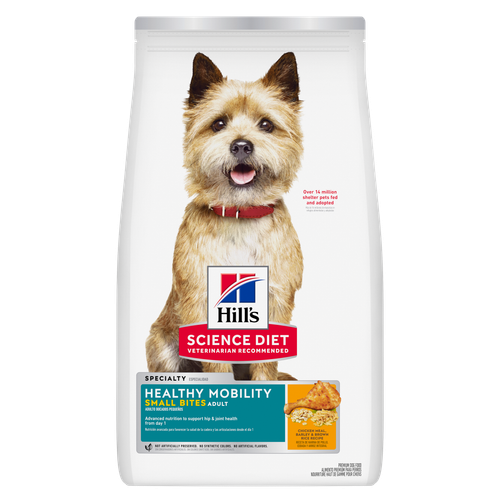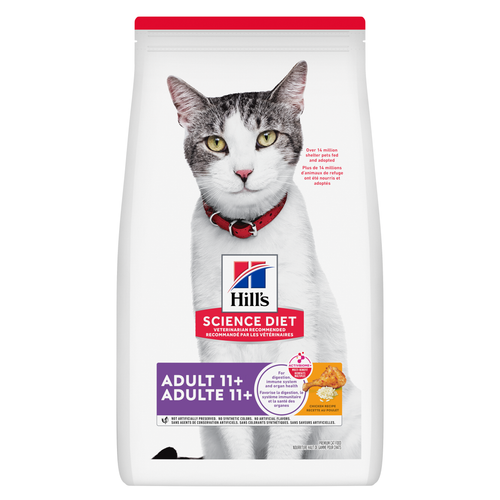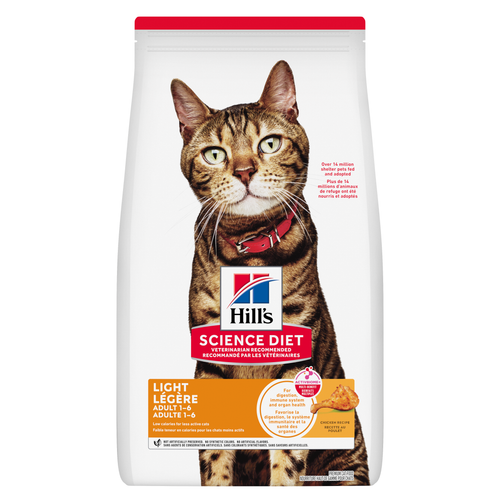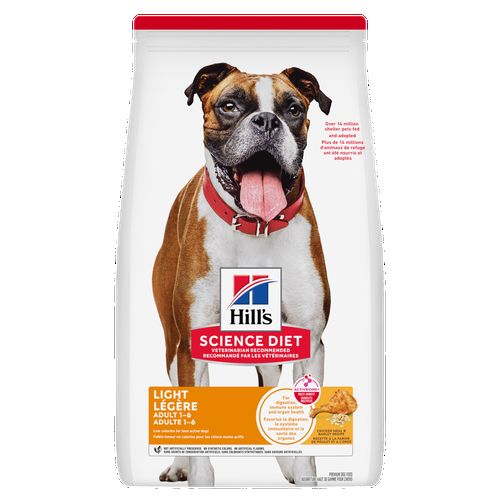
-
Find the right food for your petTake this quiz to see which food may be the best for your furry friend.Find the right food for your petTake this quiz to see which food may be the best for your furry friend.Featured products
 Adult Light Large Breed Chicken Meal & Barley Recipe Dog Food
Adult Light Large Breed Chicken Meal & Barley Recipe Dog Food18% lower calories vs. Science Diet Large Breed Adult
Shop Now Adult Sensitive Stomach & Skin Small & Mini Chicken Recipe Dog Food
Adult Sensitive Stomach & Skin Small & Mini Chicken Recipe Dog FoodHill's Science Diet Sensitive Stomach & Skin Small & Mini dry dog food is tailored nutrition for Small & Mini dogs while being gentle on stomachs. Nourishes skin & promotes a lustrous coat.
Shop Now Adult Healthy Mobility Small Bites Chicken Meal, Barley & Brown Rice Recipe Dog Food
Adult Healthy Mobility Small Bites Chicken Meal, Barley & Brown Rice Recipe Dog FoodAdvanced nutrition to support hip & joint health from day 1
Shop NowFeatured products Adult 11+ Chicken Recipe Cat Food
Adult 11+ Chicken Recipe Cat FoodSupports brain health & beautiful fur. Helps keep immune system, heart & kidneys healthy.
Shop Now Adult Light Chicken Recipe Cat Food
Adult Light Chicken Recipe Cat Food20% lower calories vs. Hill's Science Diet Adult
Shop Now Adult Healthy Cuisine Seared Tuna & Carrot Medley Cat Food
Adult Healthy Cuisine Seared Tuna & Carrot Medley Cat FoodDelicious seared tuna paired with tender carrots in a mouthwatering sauce
Shop Now -
Dog
- Dog Tips & Articles
-
Health Category
- Weight
- Food & Environmental Sensitivities
- Urinary
- Digestive
- Joint
- Kidney
- Dental
- Cancer
-
Life Stage
- Puppy Nutrition
- Adult Nutrition
- Senior Nutrition
Cat- Cat Tips & Articles
-
Health Category
- Weight
- Skin & Food Sensitivities
- Urinary
- Digestive
- Kidney
- Dental
- Stress
- Cancer
-
Life Stage
- Kitten Nutrition
- Adult Nutrition
Featured articles Importance of DHA in your Pet's Food
Importance of DHA in your Pet's FoodLearn about DHA, Docosahexaenoic Acid, a natural omega-3 fatty acid that is essential in the development of the brain and nervous system in cats & dogs.
Read More Water
WaterDiscover why water is the most important nutrient for your dog or cat to live a healthy life. Find out how much water your pet should consume each day.
Read More Antioxidants
AntioxidantsUnderstand the importance of antioxidants in your dog or cat's food, and how they can help protect your pet and keep them healthy.
Read More -


Help, my dog ate deodorant! If you've ever been in this worrisome situation, you might be wondering how serious a problem it is as well as what the harmful ingredients in deodorant are?
Most dogs do sample non-food items from time to time. The technical term for this compulsion is pica (pronounced pie-cuh). While some objects pass uneventfully, in other instances, the ingestion of non-food items can result in an emergency exploratory surgery and an overnight veterinary hospital stay. So, what do you do if your dog eats deodorant? First, let's investigate the harmful ingredients in deodorant.
Harmful Ingredients in Deodorant
If you peek at the back of a deodorant stick, you may be alarmed by just how many chemicals and unfamiliar ingredients may be inside. Triclosan, for example, is an antibacterial chemical used in deodorants to kill odor-causing germs on the skin. Phthalates, which have taken a lot of heat lately in the health-conscious community, are common ingredients in all personal care products, including deodorants and antiperspirants. Parabens are present as well, but they're used primarily as preservatives. Triclosan, phthalates and parabens do not cause harm when ingested in small quantities, but there are two ingredients in deodorants and antiperspirants that can cause harm:
- Aluminum: This ingredient tends to be found in antiperspirants or deodorant/antiperspirant combination products. It is best known for plugging sweat ducts to stop sweating. Chronic use of aluminum in human products is under investigation for possible health risks, but ingesting aluminum from eating an antiperspirant stick is relatively non-toxic to dogs beyond causing mild gastrointestinal issues.
- Xylitol: The most harmful ingredient your pooch may be exposed to is actually found most often in natural deodorants. Xylitol can be used as a prebiotic to help maintain a favorable community of microflora on the skin. According to the FDA, xylitol is very toxic to dogs. If your deodorant contains xylitol and your pup ingests it, consider it an emergency and seek veterinary care immediately. Xylitol is also a common ingredient in many foods as it is a sugar substitute, which is another reason to avoid feeding your dog foods not made for them.
Signs that My Dog Ate Deodorant
In the case of your dog eating deodorant, there is a risk of intestinal obstruction. Clinical signs that could indicate a gastrointestinal blockage include:
- Vomiting
- Diarrhea
- Constipation or straining to defecate
- Loss of appetite
- Assuming the "downward dog" position with front end lowered and rear end remaining elevated
- Drooling
- Lethargy
If your dog passes bloody stool or shows signs of abdominal pain, seek veterinary care promptly. While the chances of this happening are low, as deodorant will typically pass through with minimal effects, if you have doubts, call your veterinarian.


Tasty Tips
What to Do if Your Dog Eats Deodorant
If you find your dog has eaten a deodorant stick, take a deep breath and rest assured that unless the deodorant contains xylitol, it is most likely non-toxic to dogs. However, it can still cause gastrointestinal problems, like vomiting or diarrhea, over the next 24 hours because it is a foreign object, call your vet if you have questions.

If your dog does experience diarrhea or vomiting in the 24 hours following the ingestion of a deodorant stick, here are some steps to take at home. If at any time you are worried, contact your veterinarian:
- Withhold all food, including treats (but not water), for a minimum of 12 hours. This time period gives inflamed and irritated intestines a chance to calm and heal.
- During that time, they may have clear fluids as long as the vomiting or diarrhea don't continue. Water is fine, along with low-salt chicken broth diluted 50:50 with water.
- After 12 hours, you can introduce your dog to a bland diet. Options typically recommended by vets include plain cooked white rice and boiled chicken or special foods available from your veterinarian. Remove as much fat as possible from the chicken and offer it in small, frequent meals, beginning with a teaspoon-sized portion to make sure it stays down without trouble. Be sure to speak with your veterinarian of your dog's particular case before feeding.
- Increase the amount and frequency of feeding if your dog continues to do well on the bland food.
- After a day of stomach pampering on a gentle diet, feed your pup regular-sized meals with 25% regular food and 75% chicken and rice or the vet recommended food, then increase the proportion of regular food over the course of two days until your dog has returned to normal.
If you see no changes to your dog, pay a visit to your vet immediately.
My Dog Ate Deodorant, but Why?
According to Merck Veterinary Manual, the first step a vet takes in evaluating a dog for pica is to consider the substance that was eaten and the surrounding circumstances. Some items may be eaten if the dog is deficient in a certain nutrient or has some stomach upset. Because there can be a medical reason for your dog's unusual meal of choice, your vet may first want to run some basic bloodwork to make sure your dog is otherwise healthy.
If your vet determines that your pup is healthy, then pica is considered behavioral. Puppies explore the world with their mouth, and this behavior never fully goes away. A common behavioral reason dogs ingest non-food objects is simple boredom. If you're gone for the day, your pup may self-entertain by chewing on a smelly sock and end up eating it in the process.
Eating a stick of deodorant is more common among dogs than you might think. Not only does the deodorant have a novel fragrance, but you rub it under your arms daily; therefore, for your pup, it smells like their favorite person in the world. It is best to keep substances like deodorants and antiperspirants in closed cupboards and away from your curious pup!


Dr. Laci Schaible is a small animal veterinarian, veterinary journalist, and a thought leader in the industry. She received her Doctor of Veterinary Medicine from Texas A&M University and her Masters in Legal Studies from Wake Forest University.
Related products

18% lower calories vs. Science Diet Large Breed Adult

Advanced nutrition to support hip & joint health from day 1

18% lower calories vs. Science Diet Adult

Hill's Science Diet Sensitive Stomach & Skin Small & Mini dry dog food is tailored nutrition for Small & Mini dogs while being gentle on stomachs. Nourishes skin & promotes a lustrous coat.
Related articles

Discover how the field of dog science is giving us more and more insights into the inner workings of our furry best friends.

Your dog's coat and skin are a big part of your dog's overall health. Ensure you keep your dog's coat healthy, by following these simple tips.

Learn basic steps & precautions for treating a cut on your dog, including what you can put on the cut, and when you should take them to the vet.

Learn how dogs with sensitive skin can have special dietary needs, how they can develop over time in a healthy dog, and how Hill's dog food can help.

Put your dog on a diet without them knowing
Our low calorie formula helps you control your dog's weight. It's packed with high-quality protein for building lean muscles, and made with purposeful ingredients for a flavorful, nutritious meal. Clinically proven antioxidants, Vitamin C+E, help promote a healthy immune system.
Put your dog on a diet without them knowing
Our low calorie formula helps you control your dog's weight. It's packed with high-quality protein for building lean muscles, and made with purposeful ingredients for a flavorful, nutritious meal. Clinically proven antioxidants, Vitamin C+E, help promote a healthy immune system.

